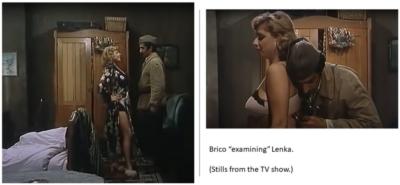Joza Horvat's Tomcat under the Helmet (part 3): On Women
In the novel Tomcat under the Helmet, Joža Horvat writes about women from the perspective of the male Partisans. It is well known that approximately 100,000 women served in the Partisan army; Jelena Batinić calculated that the percentage of women in Partisan units was at times as high as twenty percent, with an average of about ten percent. Although Horvat, through the mouth of Ilija Kapara, the protagonist of the novel, readily defends the women who joined the army—drugarice (female comrades)—he does not include any of them among the characters in the novel. Yet he finds some room for a few civilian female characters, most notably Lenka, the kafanska pjevačica (tavern singer).

Following the arrival of the Partisan brigade to which Kapara’s squad belongs at the village of Zelena Mrkvica, a few men visit the local tavern in search of something to eat. One of them, nicknamed Brico, pretends to be a doctor in order to visit the reportedly indisposed singer Lenka. As expected, Brico later boasts to his squad about his supposed conquest. The conversation nicely outlines the prevailing attitudes of the time about men and women in an almost charmingly funny way. To preserve the nuances of humor as much as possible, instead of retelling the sequence, I have translated the conversation between Brico and his comrades.
Squad member: Did she believe you were a doctor?
Brico: Why wouldn’t she believe it? It isn’t written on anyone’s forehead.
Squad member: And she didn’t defend herself?
Brico: I did not attack her so that she would have to defend herself. I also had money if she wanted.
Squad member: She didn’t ask for it in advance. And later?
Brico: Not later either.
Squad member: I guess she knew that the Partisans are poor …
Brico: I won her over, that’s the thing … And she knows her job, the beast! If they hadn’t driven us out of [Zelena] Mrkvica, I would have visited her a couple more times.
Squad member: What’s her name?
Brico: Lenka.
Squad member: And she didn’t say anything at all?
Brico: What would she say?
Squad member: I mean … She must’ve said something!
Brico: Well, she did … she said something. When everything was done, she got up, put on her clothes, stood in front of the mirror, combed her long black hair, combed it, combed, then suddenly she laughed, turned to me, and said: “I didn’t know that medical service in your brigade was so well organized. You’re the third doctor who has examined me this morning …!”
Squad member: What a bitch!
Squad member: She made that up!
Squad member: Why would she make it up? Three out of the whole brigade, that’s not that much.
He [Kapara] did not make it. He could not take it anymore. Somewhere on the border between envy and seniority, [political] awareness awakens in Kapara: You, Brico, stop! You’re embarrassing the brigade!
Brico: Why would I embarrass [it]?
Kapara: That is not worthy of a soldier of the people’s army. You will hear from the political commissar!
Brico: What’s not worthy?
Kapara: That … She’s a whore!
Brico: Of course she’s a whore, that’s why I went to her. To whom should I go—to an honest woman? The women in the brigade, women comrades, you cannot even look at them, let alone touch them, you are not allowed, and they don’t feel like it, and it’s not my fault that I’m like a little calf—I have to be between someone’s legs!
The squad bursts into laughter and Kapara feels that he has lost the battle. He is comforted by the thought that he will get satisfaction at the company meeting.
The author provides a bit more military sexist humor through the character of the Home Guard soldier Franjo Smokvina (mentioned in part 2).

In addition, Smokvina, otherwise an exemplary coward and a deserter from his army, cheerfully suggests to Kapara that instead of lunch, the two of them could “do” a civilian woman whom they met by chance while travelling through a forest—“She is ugly ... but still,” Smokvina jokes; “In my village, a hairy woman and a short-haired mare are the most expensive!”—suggests that much of the soldiers’ sexist humor and their dispositions toward women remains unmentioned.
Bibliography
Batinić, Jelena. Women and Yugoslav Partisans: A History of World War II Resistance. New York: Cambridge University Press, 2015.
Horvat, Joža. Mačak pod šljemom [Tomcat under the Helmet]. Zagreb: Naprijed, 1989.
Makarović, Berislav, dir. Mačak pod šljemom [Tomcat under the Helmet]. Zagreb: RTV Zagreb, 1978. DVD.
